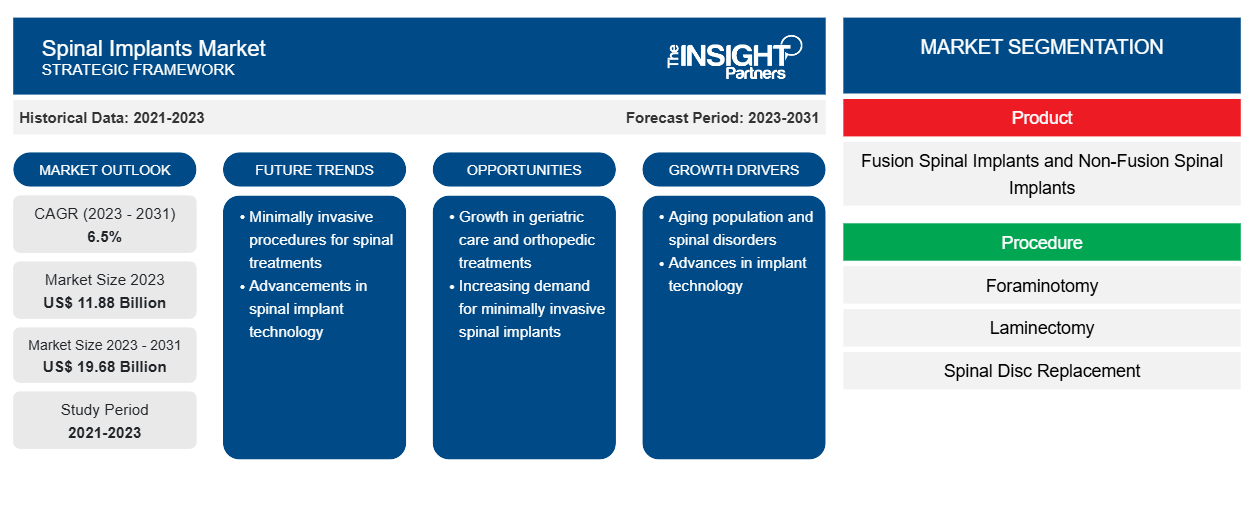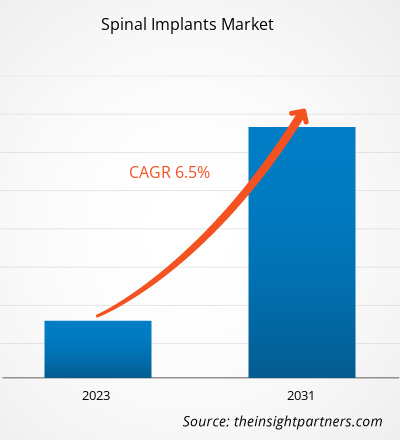[調査レポート] 脊椎インプラント市場の予測は、この市場の関係者が成長戦略を概説するのに役立ちます。市場は2023年の118億8,000万米ドルから2031年には196億8,000万米ドルに成長すると予測されており、2023年から2031年の間に6.5%のCAGRを記録すると推定されています。
市場洞察とアナリストの見解:
脊椎インプラントは、脊椎を強化し、変形を治療し、癒合を促進するために脊椎安定化処置で使用される医療機器です。脊椎損傷は、一般的に外傷または変性椎間板による椎骨のずれによって引き起こされます。脊椎インプラント処置の急増、外傷およびスポーツ関連の傷害の発生率の上昇などの要因が、脊椎インプラント市場の成長を後押ししています。しかし、厳しい規制が市場の成長を妨げています。外科処置用のインプラントの 3D プリントは、今後数年間で脊椎インプラント市場に新しいトレンドをもたらすと予想されています。
成長の原動力:
外傷およびスポーツ関連の傷害の発生率の上昇
事故やスポーツ活動によるものを含む外傷性損傷は、安定化および再建のためのインプラントの使用を含む脊椎介入を必要とすることが多い。外傷性脊椎損傷の発生率の増加は、脊椎インプラントの需要に寄与している。世界保健機関(WHO)によると、世界中で毎年約119万人が交通事故で亡くなり、2,000万~5,000万人が致命的ではない怪我を負い、その多くが障害を負っている。同様に、メイヨークリニックの推定によると、浅瀬でのダイビング、バスケットボール、フットボールなどのスポーツや運動活動は、脊髄損傷の約10%を引き起こしている。WHOのデータはまた、世界中で毎年25万~50万件の脊髄損傷(SCI)が記録されていることを示唆している。しかし、自動車事故、転倒、暴行によって引き起こされるものを含む脊髄損傷の大部分は予防可能である。 SCI を患っている人は、そうでない人よりも早期に死亡する可能性が 2 ~ 5 倍高く、低所得国および中所得国では生存率が著しく低いことが報告されています。したがって、外傷やスポーツ関連の傷害の発生率の増加は外科的介入の需要の高まりにつながり、脊椎インプラント市場の成長を後押しします。
要件に合わせてレポートをカスタマイズする
このレポートの一部、国レベルの分析、Excelデータパックなど、あらゆるレポートを無料でカスタマイズできます。また、スタートアップや大学向けのお得なオファーや割引もご利用いただけます。
- このレポートの主要な市場動向を入手してください。この無料サンプルには、市場動向から見積もりや予測に至るまでのデータ分析が含まれます。
レポートのセグメンテーションと範囲:
脊椎インプラント市場の分析は、製品、手順、材料、エンドユーザーというセグメントを考慮して実施されました。
製品別に見ると、市場は融合脊椎インプラントと非融合脊椎インプラントに分かれています。融合脊椎インプラント部門は、2023年に脊椎インプラント市場シェアを拡大しました。予測期間中、より高いCAGRを記録すると予想されます。融合脊椎インプラント部門の市場は、胸腰椎デバイス、頸部固定デバイス、および椎体間固定デバイスに細分化されています。
市場は、手順別に、椎間孔切開術、椎弓切除術、脊椎椎間板置換術、脊椎固定術、および椎間板切除術に分類されます。椎弓切除術セグメントは、2023年に最大の脊椎インプラント市場シェアを占め、さらに脊椎固定術は予測期間中に最高のCAGRを記録すると予測されています。
脊椎インプラント市場は、材質別にチタン、炭素繊維、ステンレス鋼に分類されます。ステンレス鋼セグメントは2023年に最大の市場シェアを占め、予測期間中に最高のCAGRを記録すると予想されます。
脊椎インプラント市場は、エンドユーザー別に、病院、診断・画像センター、その他に分類されています。病院セグメントは2023年に最大の市場シェアを占めました。さらに、予測期間中に最高のCAGRを記録すると予想されています。
地域分析:
脊椎インプラント市場レポートの地理的範囲には、北米、ヨーロッパ、アジア太平洋、南米および中米、中東およびアフリカが含まれます。2023年には、北米が最大の市場シェアを占めました。最新の医療機器の採用の増加、脊椎損傷の有病率の高さ、主要プレーヤーによる製品革新は、北米での脊椎インプラント市場規模の拡大に貢献しています。クリーブランドクリニックによると、米国では毎年約18,000件の新しい外傷性脊髄損傷症例が報告されており、これは人口100万人あたり約54件に相当します。さらに、加齢に伴う消耗により、米国の高齢者の間で腰痛(LBP)の有病率が高まり、脊椎手術やインプラントデバイスの需要が高まっています。国民保健サービスによると、2022年には、米国でのLBPの生涯発生率は60〜90%、年間発生率は5%と報告されています。また、この情報源によると、毎年新規患者の 14.3% が腰痛のために医師の診察を受けており、約 1,300 万人が慢性腰痛のために医師の診察を受けているとのことです。したがって、脊髄損傷と腰痛の有病率の高さは、脊椎インプラント市場の発展に有利に働いています。
脊椎インプラント市場の地域別分析
予測期間を通じて脊椎インプラント市場に影響を与える地域的な傾向と要因は、Insight Partners のアナリストによって徹底的に説明されています。このセクションでは、北米、ヨーロッパ、アジア太平洋、中東およびアフリカ、南米および中米にわたる脊椎インプラント市場のセグメントと地理についても説明します。

- 脊椎インプラント市場の地域別データを入手
脊椎インプラント市場レポートの範囲
| レポート属性 | 詳細 |
|---|---|
| 2023年の市場規模 | 118.8億米ドル |
| 2031年までの市場規模 | 196.8億米ドル |
| 世界のCAGR(2023年~2031年) | 6.5% |
| 履歴データ | 2021-2023 |
| 予測期間 | 2023-2031 |
| 対象セグメント | 製品別
|
| 対象地域と国 | 北米
|
| 市場リーダーと主要企業プロフィール |
|
脊椎インプラント市場のプレーヤー密度:ビジネスダイナミクスへの影響を理解する
脊椎インプラント市場は、消費者の嗜好の変化、技術の進歩、製品の利点に対する認識の高まりなどの要因により、エンドユーザーの需要が高まり、急速に成長しています。需要が高まるにつれて、企業は提供を拡大し、消費者のニーズを満たすために革新し、新たなトレンドを活用し、市場の成長をさらに促進しています。
市場プレーヤー密度とは、特定の市場または業界内で活動している企業または会社の分布を指します。これは、特定の市場スペースに、その規模または総市場価値と比較して、どれだけの競合相手 (市場プレーヤー) が存在するかを示します。
脊椎インプラント市場で事業を展開している主要企業は次のとおりです。
- ストライカーコーポレーション
- ジョンソン・エンド・ジョンソン
- グローバスメディカル株式会社
- ジンヴィー株式会社
- キャンバー スパイン テクノロジーズ LLC
免責事項:上記の企業は、特定の順序でランク付けされていません。

- 脊椎インプラント市場のトップキープレーヤーの概要を入手
業界の発展と将来の機会:
脊椎インプラント市場で活動する大手企業による戦略的開発のいくつかを、各社のプレスリリースに従って以下に挙げます。
- 2023 年 10 月、Silony Medical International AG は Centinel Spine の Global Fusion 事業の買収を完了しました。この買収により、Silony は米国市場に本格的に参入し、前部スタンドアロンケージの提供を大幅に強化します。
- 2023 年 9 月、Globus Medical Inc は NuVasive Inc との合併を完了しました。合併後の会社は、外科医と患者に最も包括的な筋骨格手術ソリューションの 1 つを提供し、ケアの継続全体にわたって技術的な進歩を可能にします。
- 2022 年 11 月、NuVasive Inc. は、経椎間孔腰椎椎体間固定術 (TLIF) と減圧術の完全なソリューションを提供する革新的な低侵襲手術 (MIS) 技術である NuVasive Tube System (NTS) と Excavation Micro の商用リリースを発表しました。NuVasive P360 ポートフォリオへの追加により、同社はアクセスおよび計測技術機能を強化しました。
- 2022 年 8 月、Nexus Spine は PressON 後方腰椎固定システムの完全な商業的発売を発表しました。PressON ロッドは、セット スクリューではなく椎弓根スクリューに押し付けるように設計されています。この独自の生体力学的に強力な設計は、標準システムの約 4 分の 1 のサイズです。ロッドはより速く埋め込まれ、セット スクリューが緩む可能性を回避し、患者が術中にロッドを組み立てることを可能にします。完全な市場リリースにより、同社は、改良とシステム改善の徹底的な検証期間を経て提供される柔軟な Tranquil チタン椎間固定デバイスのシリーズを含む、準拠メカニズム ベースのポートフォリオを拡大することができました。
- 2021 年 10 月、NuVasive Inc は Cohere TLIF-O インプラントを発売しました。Cohere TLIF-O インプラントを Advanced Materials Science (AMS) ポートフォリオに追加したことで、NuVasive は後部脊椎手術用の多孔質 PEEK インプラントと多孔質チタン インプラントの両方を提供する唯一の企業となりました。
競争環境と主要企業:
Stryker Corporation、Johnson & Johnson、Globus Medical Inc、ZimVie Inc、Camber Spine Technologies LLC、Spineart SA、Medtronic plc、Orthofix US LLC、ATEC Spine Inc、B. Braun SE は、脊椎インプラント市場レポートで紹介されている著名な企業の一部です。これらの企業は、新しい技術の開発、既存製品のアップグレード、および世界中で高まる消費者の需要を満たすための地理的プレゼンスの拡大に重点を置いています。
- 過去2年間の分析、基準年、CAGRによる予測(7年間)
- PEST分析とSWOT分析
- 市場規模価値/数量 - 世界、地域、国
- 業界と競争環境
- Excel データセット



Report Coverage
Revenue forecast, Company Analysis, Industry landscape, Growth factors, and Trends

Segment Covered
This text is related
to segments covered.

Regional Scope
North America, Europe, Asia Pacific, Middle East & Africa, South & Central America

Country Scope
This text is related
to country scope.
よくある質問
The spinal implants market, by end user, is categorized into hospitals, diagnostic and imaging centers, and others. The hospitals segment held the largest market share in 2023. It is further expected to register the highest CAGR during the forecast period.
The spinal implants market, by material, is segmented into titanium, carbon fiber, and stainless steel. The stainless steel segment held the largest market share in 2023; it is anticipated to register the highest CAGR during the forecast period.
The market, by procedure, is categorized into foraminotomy, laminectomy, spinal disc replacement, spine fusion, and discectomy. The laminectomy segment held the largest spinal implants market share in 2023, and spine fusion is further estimated to register the highest CAGR during the forecast period.
The spinal implants market is expected to be valued at US$ 19.68 billion in 2031.
By product, the market is bifurcated into fusion spinal implants and non-fusion spinal implants. The fusion spinal implants segment held a larger spinal implants market share in 2023. It is anticipated to register a higher CAGR during the forecast period.
The spinal implants market was valued at US$ 11.88 billion in 2023.
Factors such as surging number of spinal implant procedures and rising incidence of trauma and sport-related injuries propel the spinal implants market growth.
The spinal implants market majorly consists of the players, including Stryker Corporation, Johnson & Johnson, Globus Medical Inc, ZimVie Inc, Camber Spine Technologies LLC, Spineart SA, Medtronic plc, Orthofix US LLC, ATEC Spine Inc, and B. Braun SE.
Spinal implants are medical devices used in spine stabilization procedures to stabilize and strengthen the spine, treat deformity, and facilitate fusion. The spine injuries are generally caused by trauma or by slipped vertebrae due to degenerative intervertebral disks.
Trends and growth analysis reports related to Life Sciences : READ MORE..
The List of Companies - Spinal Implants Market
- Stryker Corporation
- Johnson & Johnson
- Globus Medical Inc
- ZimVie Inc
- Camber Spine Technologies LLC
- Spineart SA
- Medtronic plc
- Orthofix US LLC
- ATEC Spine Inc
- B. Braun SE
The Insight Partners performs research in 4 major stages: Data Collection & Secondary Research, Primary Research, Data Analysis and Data Triangulation & Final Review.
- Data Collection and Secondary Research:
As a market research and consulting firm operating from a decade, we have published and advised several client across the globe. First step for any study will start with an assessment of currently available data and insights from existing reports. Further, historical and current market information is collected from Investor Presentations, Annual Reports, SEC Filings, etc., and other information related to company’s performance and market positioning are gathered from Paid Databases (Factiva, Hoovers, and Reuters) and various other publications available in public domain.
Several associations trade associates, technical forums, institutes, societies and organization are accessed to gain technical as well as market related insights through their publications such as research papers, blogs and press releases related to the studies are referred to get cues about the market. Further, white papers, journals, magazines, and other news articles published in last 3 years are scrutinized and analyzed to understand the current market trends.
- Primary Research:
The primarily interview analysis comprise of data obtained from industry participants interview and answers to survey questions gathered by in-house primary team.
For primary research, interviews are conducted with industry experts/CEOs/Marketing Managers/VPs/Subject Matter Experts from both demand and supply side to get a 360-degree view of the market. The primary team conducts several interviews based on the complexity of the markets to understand the various market trends and dynamics which makes research more credible and precise.
A typical research interview fulfils the following functions:
- Provides first-hand information on the market size, market trends, growth trends, competitive landscape, and outlook
- Validates and strengthens in-house secondary research findings
- Develops the analysis team’s expertise and market understanding
Primary research involves email interactions and telephone interviews for each market, category, segment, and sub-segment across geographies. The participants who typically take part in such a process include, but are not limited to:
- Industry participants: VPs, business development managers, market intelligence managers and national sales managers
- Outside experts: Valuation experts, research analysts and key opinion leaders specializing in the electronics and semiconductor industry.
Below is the breakup of our primary respondents by company, designation, and region:

Once we receive the confirmation from primary research sources or primary respondents, we finalize the base year market estimation and forecast the data as per the macroeconomic and microeconomic factors assessed during data collection.
- Data Analysis:
Once data is validated through both secondary as well as primary respondents, we finalize the market estimations by hypothesis formulation and factor analysis at regional and country level.
- Macro-Economic Factor Analysis:
We analyse macroeconomic indicators such the gross domestic product (GDP), increase in the demand for goods and services across industries, technological advancement, regional economic growth, governmental policies, the influence of COVID-19, PEST analysis, and other aspects. This analysis aids in setting benchmarks for various nations/regions and approximating market splits. Additionally, the general trend of the aforementioned components aid in determining the market's development possibilities.
- Country Level Data:
Various factors that are especially aligned to the country are taken into account to determine the market size for a certain area and country, including the presence of vendors, such as headquarters and offices, the country's GDP, demand patterns, and industry growth. To comprehend the market dynamics for the nation, a number of growth variables, inhibitors, application areas, and current market trends are researched. The aforementioned elements aid in determining the country's overall market's growth potential.
- Company Profile:
The “Table of Contents” is formulated by listing and analyzing more than 25 - 30 companies operating in the market ecosystem across geographies. However, we profile only 10 companies as a standard practice in our syndicate reports. These 10 companies comprise leading, emerging, and regional players. Nonetheless, our analysis is not restricted to the 10 listed companies, we also analyze other companies present in the market to develop a holistic view and understand the prevailing trends. The “Company Profiles” section in the report covers key facts, business description, products & services, financial information, SWOT analysis, and key developments. The financial information presented is extracted from the annual reports and official documents of the publicly listed companies. Upon collecting the information for the sections of respective companies, we verify them via various primary sources and then compile the data in respective company profiles. The company level information helps us in deriving the base number as well as in forecasting the market size.
- Developing Base Number:
Aggregation of sales statistics (2020-2022) and macro-economic factor, and other secondary and primary research insights are utilized to arrive at base number and related market shares for 2022. The data gaps are identified in this step and relevant market data is analyzed, collected from paid primary interviews or databases. On finalizing the base year market size, forecasts are developed on the basis of macro-economic, industry and market growth factors and company level analysis.
- Data Triangulation and Final Review:
The market findings and base year market size calculations are validated from supply as well as demand side. Demand side validations are based on macro-economic factor analysis and benchmarks for respective regions and countries. In case of supply side validations, revenues of major companies are estimated (in case not available) based on industry benchmark, approximate number of employees, product portfolio, and primary interviews revenues are gathered. Further revenue from target product/service segment is assessed to avoid overshooting of market statistics. In case of heavy deviations between supply and demand side values, all thes steps are repeated to achieve synchronization.
We follow an iterative model, wherein we share our research findings with Subject Matter Experts (SME’s) and Key Opinion Leaders (KOLs) until consensus view of the market is not formulated – this model negates any drastic deviation in the opinions of experts. Only validated and universally acceptable research findings are quoted in our reports.
We have important check points that we use to validate our research findings – which we call – data triangulation, where we validate the information, we generate from secondary sources with primary interviews and then we re-validate with our internal data bases and Subject matter experts. This comprehensive model enables us to deliver high quality, reliable data in shortest possible time.


 このレポートの無料サンプルを入手する
このレポートの無料サンプルを入手する